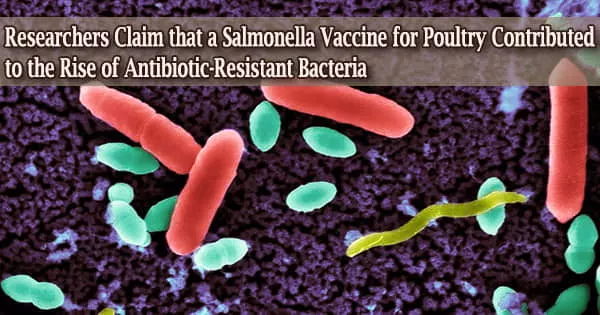According to a study of the evolution of Salmonella bacteria infecting Brazilian poultry, the introduction of a Salmonella vaccine, combined with increased antibiotic use by Brazilian farmers, has resulted in the growth of antibiotic-resistant strains that are less likely to cause sickness in humans.
These findings are reported in a recent study published June 2nd in the open-access journal PLOS Genetics by Andrea Micke Moreno of the University of São Paulo, Brazil, and Alison Mather of Quadram Institute Bioscience, UK.
Salmonella enterica is a bacteria that causes food poisoning in humans and is usually spread through tainted poultry. Brazil is the world’s largest exporter of chicken meat, and a team led by Micke Moreno and Mather sought to see if the Salmonella strains found there were contributing to food poisoning incidents in nations that import their products.
The genomes of 183 Salmonella recovered from hens in Brazil were compared to 357 Salmonella genomes collected from people, domestic poultry, and imported Brazilian poultry products in the UK.
They also looked at over 1,200 publically available genomes of the two main varieties of Salmonella prevalent in Brazil to see what they could learn about their evolution.
The researchers discovered that separate lineages of the two most common Salmonella kinds emerged in Brazil in the early 2000s, around the same time that the country implemented a Salmonella vaccine for poultry.
Through our genomic detective work, we have tracked how changes in chicken rearing in Brazil have changed the profile of Salmonella bacteria found circulating within the poultry industry. Whilst this poses no immediate health risk to importing countries like the UK, the bacteria were resistant to antimicrobial drugs, and this highlights the importance of taking a ‘One Health’ approach that sees the connections between the health of people, animals, and the environment, especially when assessing global food supply chains.
Alison Mather
These bacteria have genes that allow them to resist three different antibiotics. Despite their development in Brazil, antibiotic-resistant bacteria in the UK have only caused a few cases of Salmonella in people and have not spread to domestic hens.
Overall, our findings imply that the adoption of the Salmonella vaccine in Brazil, together with increased antibiotic use, facilitated the growth of drug-resistant Salmonella strains, but that these bacteria have not resulted in an increase in food poisoning cases in the United Kingdom.
The researchers emphasize that their analysis of Salmonella genomes from a variety of sources in Brazil and the United Kingdom highlights the importance of a “One Health” approach to disease, which entails collaborative, multidisciplinary efforts to improve the health of people, animals, and the environment.
Mather adds, “Through our genomic detective work, we have tracked how changes in chicken rearing in Brazil have changed the profile of Salmonella bacteria found circulating within the poultry industry.”
“Whilst this poses no immediate health risk to importing countries like the UK, the bacteria were resistant to antimicrobial drugs, and this highlights the importance of taking a ‘One Health’ approach that sees the connections between the health of people, animals, and the environment, especially when assessing global food supply chains.”





